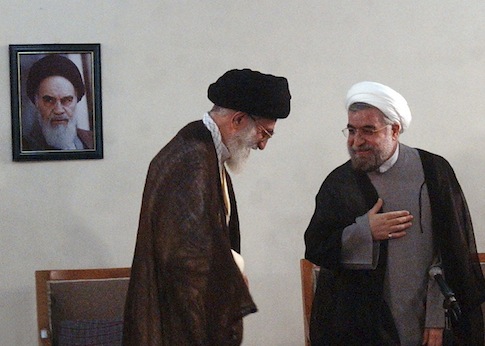The White House is currently examining ways to enable Iran to have its own "domestic" uranium enrichment program, according to a senior Obama administration official.
As the details of a six month interim nuclear deal between Iran and Western nations are hashed out, the White House is exploring the practicality of permitting Iran to continue certain enrichment activities, an issue that Iranian officials have described as a "redline."
"Over the next six months, we will explore, in practical terms, whether and how Iran might end up with a limited, tightly constrained, and intensively monitored civilian nuclear program, including domestic enrichment," White House National Security Council (NSC) spokesman Caitlin Hayden told the Washington Free Beacon.
"Any such program," she said, "would be subject to strict and verifiable curbs on its capacity and stockpiles of enriched uranium for a significant number of years and tied to practical energy needs that will remain minimal for years to come."
The White House clarified its openness to a limited Iranian enrichment program just days after Iranian President Hassan Rouhani promised to "forge ahead" with the country’s controversial nuclear program.
Rouhani stated over the weekend that Iran’s contested enrichment program would "never stop" despite the regime’s promise to eventually halt most nuclear activities for a period of six months under an interim agreement inked two weeks ago in Geneva.
The deal reached in Geneva would provide Iran up to $7 billion dollars in sanctions relief in exchange for a temporary halt to some of its nuclear activities, including the enrichment of nuclear fuel to high-grade levels.
Iran’s right to enrich uranium, the key component in a nuclear bomb, had been a key sticking point in Geneva. Many in Congress say that Iran should be forced to dismantle its entire nuclear program and be prohibited from all enrichment activities.
Asked about Rouhani’s promise to continue enriching uranium—a promise echoed by other senior Iranian officials—the White House’s Hayden told the Free Beacon that "the United States does not recognize that Iran has a ‘right to enrich.’"
However, "the Iranian people should have access to nuclear energy for peaceful purposes," Hayden said, echoing recent comments made by Obama.
The precise requirements of the interim deal with Iran have yet to be finalized, the White House told the Free Beacon last week. This means that Iran is not yet beholden to the six-month nuclear freeze negotiated as part of the deal.
The White House could not tell the Free Beacon late Monday exactly when these final discussion will take place.
Congressional critics have lambasted the White House in recent days for approving a deal that they say would allow the Iranians to continue their most controversial nuclear activities.
"Providing Iran with sanctions relief without dismantling their nuclear weapons program was a colossal mistake," Rep. Peter Roskam (R., Ill.) told the Free Beacon on Tuesday.
"The Obama administration bargained away America’s greatest pressure point on Iran in exchange for empty promises and cosmetic concessions," said Roskam, who has led a push in the House to enact more stringent sanctions on Iran.
"It’s no surprise the Iranian regime is already taking a victory lap, proudly trumpeting its right to enrich uranium and maintain nuclear infrastructure under the agreement," he said.
Others demanded that the White House explain why Iran can be trusted to continue its enrichment activities given the regime’s past efforts to deceive the world and obfuscate its weapons program
"Everything Iran enriches is a risk that they could make a nuclear bomb," said one senior official with a Jewish organization. "They’re playing games" with the public and "need to be clear on what their bottom line is." "
"Five centrifuges is five too many," the source said. "Nine-thousand centrifuges is 9,000 too many."
The White House maintains that it will address all unresolved issues with Iran as the deal develops.
Iran has made clear that it will not halt activity at its nuclear sites in Fordow and Arak despite promises to do so.
"Iran must also address the future disposition of Fordow and Arak, and the relevant [United Nations] Security Council resolutions," Hayden told the Free Beacon. "Iran has acknowledged that such constraints must be part of any long-term arrangement, which is a major concession and one they have opposed publicly and explicitly for years."
The White House will not sign off on the final interim deal unless Iran agrees to everything previously discussed.
"The first step requires agreement on all aspects of the comprehensive solution," Hayden said. "Nothing is agreed until everything is agreed."
Meanwhile, the White House has reportedly been aggressively lobbying lawmakers to shelve legislation aimed at imposing new sanctions on Iran.
